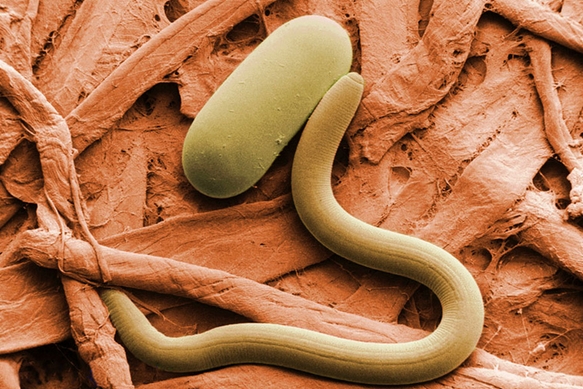 Parler
Parler Gab
Gab
- Over 74 cases of cryptosporidium linked to Wales farm; 20% of Americans face environmentally induced illness.
- Parasites like toxoplasmosis and toxocariasis infect millions nationwide, often misdiagnosed.
- Formaldehyde, chlorine and pesticides contribute to chronic symptoms, from headaches to cardiovascular issues.
- Doctors like Dr. Peter McCullough champion holistic approaches, including ivermectin-based cleanses.
- Experts demand awareness, environmental reforms and preventive measures due to systemic health threats.
A toxic double threat: Chemicals compounding health crises
While parasites loom large, chemical contamination exacerbates health crises. From formaldehyde in furniture to chlorine-laden tap water, Americans face daily exposure to toxins driving chronic conditions. A Texas lab study, led by Dr. John Laseter, detects hundreds of chemical contaminants in U.S. water supplies, with links to cerebral symptoms and cardiovascular harm. “Plastics, pesticides and household chemicals damage cell membranes, triggering arthritis, memory loss and even cancer,” says Dr. Rick Simpson, author of The Environmental Health Crisis. “Our bodies are battlegrounds for pollutants no one was trained to diagnose.”When symptoms defy explanation
Victims of environmental and parasitic illnesses often face skepticism. Neurological symptoms — headaches, fatigue, depression and mood swings — along with physical complaints like chronic joint pain, muscle weakness, or skin rashes, are easily dismissed as psychosomatic or stress-related. Parasites such as Toxoplasma gondii or intestinal worms can infiltrate multiple body systems, triggering behavioral changes akin to ADHD or anxiety disorders in children, while impairing cognitive function and energy levels in adults. Dr. Kelly Victory, co-founder of The Wellness Company, notes that patients often battle “mystery” symptoms for years, enduring misdiagnoses of fibromyalgia, irritable bowel syndrome, or autoimmune conditions before parasite cleanses, herbal antiparasitics, or detox regimens deliver relief. “There’s a pervasive gap between conventional medicine and environmental or parasitic causes,” she explains. “Many patients were told their fatigue was depression, their allergies were hypochondria, or their skin eruptions were dermatitis. It’s hard to convince a doctor your allergy-like symptoms stem from swallowing microplastics in toothpaste — or that your chronic insomnia is due to a tapeworm releasing neurotoxins at night.” Parasites such as Cryptosporidium or Dientamoeba fragilis can evade standard stool tests, as these rely on snap-shot sampling, while stool-avoiding species like Strongyloides stercoralis thrive undetected. Often, sufferers face the dual burden of physical deterioration and psychological invalidation, as their symptoms persist beyond conventional medicine’s paradigms. Victory’s clinic has documented cases where patients, labeled with chronic fatigue syndrome or bipolar disorder, achieved remission after addressing latent parasitic infections. “Modern medicine’s focus on symptom management over root causes leaves millions to suffer in diagnostic limbo,” she says, highlighting how parasites manipulate host immunity, trigger allergies, or erode gut-barrier function — masking themselves as autoimmune or neurological conditions. Until testing evolves to confront this hidden epidemic, patients like these remain trapped between their bodies’ cries for help and a system struggling to hear.The push for holistic solutions
Dr. Peter McCullough, a vocal critic of one-size-fits-all medicine, urges proactive wellness measures. His clinic combines parasite cleanses (e.g., ivermectin and mebendazole blends) with dietary and environmental interventions. “We’re all subject to chemical and biological pollutants,” McCullough states. “But hospitals can’t treat what they don’t recognize — so individuals must take charge.” Case studies highlight success stories: A patient with undiagnosed toxoplasmosis regained her health after a cleanse, while retirees avoiding formaldehyde-laden furnishings reported fewer joint issues.The path forward: Prevention or peril?
Experts agree systemic change is overdue. Dr. Laseter’s research highlights the need for nationwide chemical testing in water and foods, while parasite prevention requires stricter hygiene standards. Consumer vigilance — choosing organic produce, filtered water and toxin-free products — is critical. The CDC’s 2014 report emphasized that many NPIs are treatable if caught early. Yet with health literacy lagging, patients like Jennifer W., a Wellness Company client, reflect a growing movement: “I trusted pills — and nearly paid with my life,” she says. “Now, I trust science — and take my health into my own hands.” As toxins persist and outbreaks recur, experts warn: Environmental and biological health threats demand urgent, unified action — or the crisis will only deepen. Amidst rising parasite outbreaks and pervasive chemical contamination, the U.S. faces a health challenge requiring vigilance at every level — individual, community and governmental. Without sweeping reform, America’s silent health crisis may soon roar. Sources for this article include: BigLeaguePolitics.Substack.com Yahoo.com CBSNews.comA communist billionaire’s land grab shakes military security
By Willow Tohi // Share
Fungal contamination sparks nationwide RECALL of medicated swabs
By Ramon Tomey // Share
Shingles surge sparks new focus on holistic care: Tackling pain, immunity and risks
By Willow Tohi // Share
LA rioters are defending VIOLENT CRIMINALS arrested by ICE
By Ramon Tomey // Share
Fibrous spike protein CLOTS found in children of vaccinated mothers
By Lance D Johnson // Share
Governments continue to obscure COVID-19 vaccine data amid rising concerns over excess deaths
By patricklewis // Share
Tech giant Microsoft backs EXTINCTION with its support of carbon capture programs
By ramontomeydw // Share
Germany to resume arms exports to Israel despite repeated ceasefire violations
By isabelle // Share










